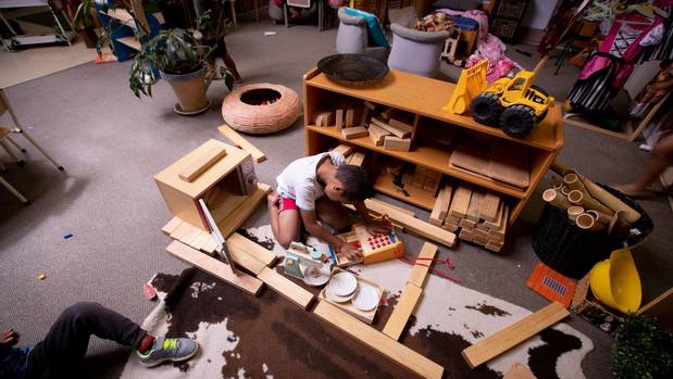
Families receiving childcare subsidies have dropped by 30 per cent as more parents find themselves at home with their children.
The drop in Work and Income childcare subsidies, from 22,353 at the end of June last year to 15,631 on June 30 this year, provides some of the first hard data on the numbers of parents now at home with children because they have lost their jobs or are working at home.
The data is only for a small proportion of the 199,000 children who attended early childhood education (ECE) in June last year - broadly, affecting families with total income below the average wage for one person, currently $1114 a week before tax.
The Work and Income subsidy of up to $265 a week begins to phase out with family income above $800 and disappears when family income hits $1400 with one child, $1600 with two children or $1800 for three children.
But the big drop in the subsidies suggests that Covid-19 may have hit overall ECE attendance by even more than a 20 per cent fall estimated by the Early Childhood Council last week.
Auckland ECE centre owner Darius Singh, who chairs the council, said extended families were taking over childcare especially in the Asian and Pasifika communities.
"All it takes is one relative who can stay home now and suddenly they are the centrepiece for all the children in the extended family," he said.
"We noticed a 30 per cent hit. The [wage] subsidy was a great injection for May and June, but it was always the recovery for the next six to 12 months that was going to be the big job. We are definitely feeling that now."
He said many parents were also still afraid to send their children back to childcare because of the virus.
"We just thought we were getting over it, and then the escapes [from quarantine] started happening, and a 2-year-old child has got Covid. We just can't fight an enemy that we can't see," he said.
But the pattern is mixed, with many centres saying attendance is back to normal.
Early Childhood Council chief executive Peter Reynolds said: "It's very much pockets around the country rather than anything universal."
Kathy Wolfe of Te Rito Maioha Early Childhood NZ, which represents community-owned centres, said: "We think that this is also potentially a geographic issue. For example Auckland centres are struggling and numbers have reduced. We do know that our Pasifika services are struggling too.
"[But] we spoke with Jocelyn Wright from Hagley Preschool in Christchurch and she has found that community-based services in particular are doing okay.
"It is the centres up north with too many services around them that are struggling or the ones where whānau have lost their job and had to pull their tamariki out due to number of hours requirements – mainly privately-owned ones."
Auckland Kindergarten Association general manager of education Bram Kukler said kindy enrolments are back to normal on the North Shore but "when it comes to the south, parts of central and west Auckland, we have seen a significant reduction".
Across the whole Auckland region enrolments are down only 3 per cent since before Covid, but Work and Income childcare subsidies are down about 40 per cent.
The biggest privately-owned ECE company, BestStart, said it was "seeing affected families across all socio-economic levels".
"This can impact their children, and potentially, time in their centre. We do everything we can to keep them there. Stability and a sense of belonging is what they need right now," she said.
A Manukau family who asked to be anonymous said they tried to cut their 16-month-old daughter's hours at a BestStart centre when the dad lost his job as a construction site manager, but the centre let them pay less and keep the same hours.
They started transitioning the child into the centre just before the lockdown and started again when the centre reopened.
"In the beginning it was so difficult to get her transitioned into the centre, that's why they said it's better we don't change her routine," the mum said.
Kukler and BestStart deputy chief executive Fiona Hughes said the drop in Work and Income subsidies might also reflect delays in processing subsidy applications after the lockdown.
But he said there was also a drop in the number of subsidy applications, with 1649 applications at June 30 compared to 2294 on July 1 last year.
Take your Radio, Podcasts and Music with you









